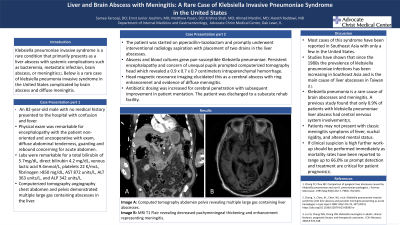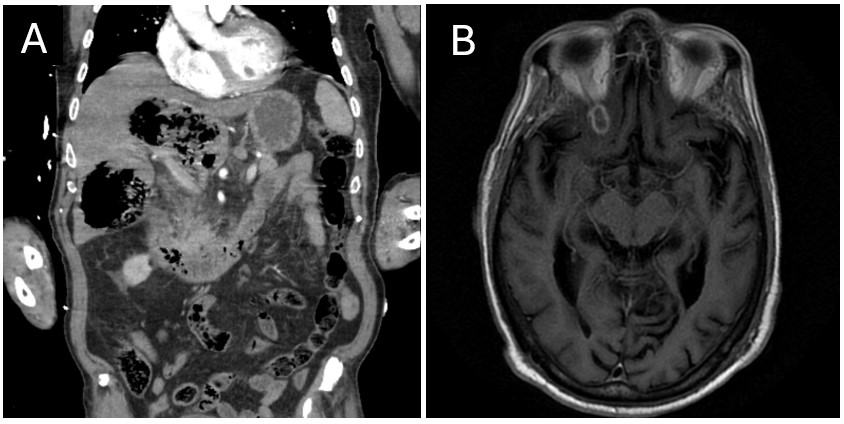Tuesday Poster Session
Category: Liver
P4694 - Liver and Brain Abscess With Meningitis: A Rare Case of Klebsiella pneumoniae Invasive Syndrome in the United States
Tuesday, October 29, 2024
10:30 AM - 4:00 PM ET
Location: Exhibit Hall E

Has Audio

Ernst Joachim, MD
Advocate Christ Medical Center
Oak Lawn, IL
Presenting Author(s)
Samee Farooqi, DO, Ernst Joachim, MD, Matthew Posen, DO, Krishna Shah, MD, Ahmad Mardini, MD, Harreth Raddawi, MD
Advocate Christ Medical Center, Oak Lawn, IL
Introduction: Klebsiella pneumoniae invasive syndrome is a rare condition that primarily presents as a liver abscess with systemic complications such as bacteremia, metastatic infection, brain abscess, or meningitis. Below is a rare case of klebsiella pneumonia invasive syndrome in the United States complicated by brain abscess and diffuse meningitis.
Case Description/Methods: An 82-year-old male with no medical history presented to the hospital with confusion and fever. Physical exam was remarkable for encephalopathy with the patient non-oriented and uncooperative with exam, diffuse abdominal tenderness, guarding and rebound concerning for acute abdomen. Labs were remarkable for a total bilirubin of 5.7mg/dL, direct bilirubin 4.2 mg/dL, venous lactic acid 9.4mmol/L, platelets 22 K/mcL, fibrinogen >850 mg/dL, AST 872 units/L, ALT 363 units/L, and ALP 342 units/L. Computerized tomography angiography chest abdomen and pelvis demonstrated multiple large gas containing abscesses in the liver. The patient was started on piperacillin-tazobactam and promptly underwent interventional radiology aspiration with placement of two drains in the liver abscesses. Abscess and blood cultures grew pan-susceptible Klebsiella pneumoniae. Persistent encephalopathy and concern of unequal pupils prompted computerized tomography head which revealed a 0.9 x 0.7 x 0.7 centimeters intraparenchymal hemorrhage. Head magnetic resonance imaging elucidated this as a cerebral abscess with ring enhancement and evidence of diffuse meningitis. Antibiotic dosing was increased for cerebral penetration with subsequent improvement in patient mentation. The patient was discharged to a subacute rehab facility.
Discussion: Most cases of this syndrome have been reported in Southeast Asia with only a few in the United States. Studies have shown that since the 1980s the prevalence of klebsiella pneumoniae infections has been increasing in Southeast Asia and is the main cause of liver abscesses in Taiwan. Klebsiella pneumonia is a rare cause of brain abscesses and meningitis. A previous study found that only 0.9% of patients with klebsiella pneumoniae liver abscess had central nervous system involvement. Patients may not present with classic meningitis symptoms of fever, nuchal rigidity, and altered mental status. If clinical suspicion is high further work-up should be performed immediately as mortality rates have been reported to range up to 66.0% so prompt detection and treatment are critical for patient prognosis.

Disclosures:
Samee Farooqi, DO, Ernst Joachim, MD, Matthew Posen, DO, Krishna Shah, MD, Ahmad Mardini, MD, Harreth Raddawi, MD. P4694 - Liver and Brain Abscess With Meningitis: A Rare Case of <i>Klebsiella pneumoniae</i> Invasive Syndrome in the United States, ACG 2024 Annual Scientific Meeting Abstracts. Philadelphia, PA: American College of Gastroenterology.
Advocate Christ Medical Center, Oak Lawn, IL
Introduction: Klebsiella pneumoniae invasive syndrome is a rare condition that primarily presents as a liver abscess with systemic complications such as bacteremia, metastatic infection, brain abscess, or meningitis. Below is a rare case of klebsiella pneumonia invasive syndrome in the United States complicated by brain abscess and diffuse meningitis.
Case Description/Methods: An 82-year-old male with no medical history presented to the hospital with confusion and fever. Physical exam was remarkable for encephalopathy with the patient non-oriented and uncooperative with exam, diffuse abdominal tenderness, guarding and rebound concerning for acute abdomen. Labs were remarkable for a total bilirubin of 5.7mg/dL, direct bilirubin 4.2 mg/dL, venous lactic acid 9.4mmol/L, platelets 22 K/mcL, fibrinogen >850 mg/dL, AST 872 units/L, ALT 363 units/L, and ALP 342 units/L. Computerized tomography angiography chest abdomen and pelvis demonstrated multiple large gas containing abscesses in the liver. The patient was started on piperacillin-tazobactam and promptly underwent interventional radiology aspiration with placement of two drains in the liver abscesses. Abscess and blood cultures grew pan-susceptible Klebsiella pneumoniae. Persistent encephalopathy and concern of unequal pupils prompted computerized tomography head which revealed a 0.9 x 0.7 x 0.7 centimeters intraparenchymal hemorrhage. Head magnetic resonance imaging elucidated this as a cerebral abscess with ring enhancement and evidence of diffuse meningitis. Antibiotic dosing was increased for cerebral penetration with subsequent improvement in patient mentation. The patient was discharged to a subacute rehab facility.
Discussion: Most cases of this syndrome have been reported in Southeast Asia with only a few in the United States. Studies have shown that since the 1980s the prevalence of klebsiella pneumoniae infections has been increasing in Southeast Asia and is the main cause of liver abscesses in Taiwan. Klebsiella pneumonia is a rare cause of brain abscesses and meningitis. A previous study found that only 0.9% of patients with klebsiella pneumoniae liver abscess had central nervous system involvement. Patients may not present with classic meningitis symptoms of fever, nuchal rigidity, and altered mental status. If clinical suspicion is high further work-up should be performed immediately as mortality rates have been reported to range up to 66.0% so prompt detection and treatment are critical for patient prognosis.

Figure: Image A: Computed tomography abdomen pelvis revealing multiple large gas containing liver abscesses. Image B: MRI T1 Flair revealing decreased pachymeningeal thickening and enhancement representing meningitis.
Disclosures:
Samee Farooqi indicated no relevant financial relationships.
Ernst Joachim indicated no relevant financial relationships.
Matthew Posen indicated no relevant financial relationships.
Krishna Shah indicated no relevant financial relationships.
Ahmad Mardini indicated no relevant financial relationships.
Harreth Raddawi indicated no relevant financial relationships.
Samee Farooqi, DO, Ernst Joachim, MD, Matthew Posen, DO, Krishna Shah, MD, Ahmad Mardini, MD, Harreth Raddawi, MD. P4694 - Liver and Brain Abscess With Meningitis: A Rare Case of <i>Klebsiella pneumoniae</i> Invasive Syndrome in the United States, ACG 2024 Annual Scientific Meeting Abstracts. Philadelphia, PA: American College of Gastroenterology.
